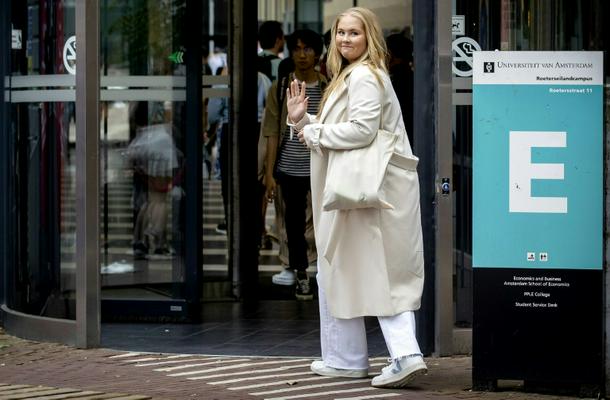
Princess Amalia started at Amsterdam university in September
The Hague (AFP) - Dutch Crown Princess Amalia has been forced to abandon plans to live in student digs for security reasons, in a move that raised fresh fears on Friday about organised crime in the Netherlands.
King Willem-Alexander and his wife Queen Maxima announced late Thursday – just weeks after the 18-year-old started at Amsterdam University – that Amalia will have to stay behind palace walls.
Officials would not confirm details, but the move comes weeks after reports that Amalia and Prime Minister Mark Rutte were mentioned in communications by organised crime groups which led to fears of kidnappings.
Her mother said the move has “enormous consequences” for her daughter, while it has come as a shock in a country where public figures often move around with little protection.
Experts say it has reinforced fears that the Netherlands is becoming a “narco-state” following a high-profile series of cases involving drug trafficking groups.
“It’s about an 18-year-old girl who can’t have a student life because she’s apparently the target of the Mocro-mafia,” said Rick Evers, a Dutch reporter specialising in royal matters.
Named after their Moroccan roots, the Mocro-mafia are crime gangs specialising in the Netherlands’ budding drug trade, particularly cocaine and are mainly based in Amsterdam.
- ‘Enormous consequences’ -

The princess has been forced to abandon plans to live in student accommodation
The heir to the Dutch throne was captured beaming by photographers when she started at university last month, with much made of the fact that she planned to live in student accommodation.
But an unusually candid admission during a state visit to Sweden on Thursday, the Dutch king, 55, and queen, 51, revealed that Amalia had been forced to remain at the heavily-guarded royal palace in The Hague.
Asked how the Amalia was doing as a student, a clearly emotional Queen Maxima said “you must have heard the news.”
“She can’t live in Amsterdam and she can’t really go outside (the palace)… It has enormous consequences on her life,” Maxima said.
Premier Rutte – himself until recently often seen riding a bike around the Hague – described Amalia’s situation as “terrible and worrisome.”
“Everything is being done to keep the crown princess safe,” he told reporters on Friday.
Dutch Justice and Security Minister Dilan Yesilgoz-Zegerius described organised crime as a “fundamental problem,” adding that her ministry was “working hard day and night to ensure her security.”
But the news did not come out of a vacuum.
In September De Telegraaf, one of the Netherlands’ top newspapers, reported that security had been significantly tightened around Amalia and Rutte.
It said both of them had appeared in organised crime communications, which may indicate plans for an attack or kidnapping.
At the same time Dutch newspapers reported increased scrutiny on the communications of alleged “Mocro-Mafia” chief Ridouan Taghi, who is on trial in the Netherlands, his gang linked to several high-profile murders.
Those include prominent journalist Peter R. de Vries, who was gunned down in broad daylight in an Amsterdam street last year and Derk Wiersum, a defence lawyer for a prosecution witness.
- ‘Abnormal situation’ -

Security was tight for the arrival of the princess at university
The developments have enforced fears that Europe’s fifth-largest economy was gradually tilting towards a narco state, with criminals exploiting the country’s relaxed drug policies to ship masses of cocaine through Europe’s largest port in Rotterdam.
The threat around the princess “is being taken very seriously by the authorities,” said security expert Jelle van Buuren of the Leiden University.
“It is rumoured that the threat comes from organised crime,” Van Buuren told AFP.
Royal reporter Evers, who was with the Dutch king and Queen on Thursday when they made the shock revelation, was also there when Amalia started at university to enrol for a bachelor’s degree in Psychology, Politics and Law.
“We saw there was a very large increase in the number of security guards, both visible and invisible with heavy weapons hidden in bags,” Evers said.
“It was a very abnormal and unusual situation,” he told AFP.
“Organised crime is now an important theme which seems out of control in the Netherlands.”